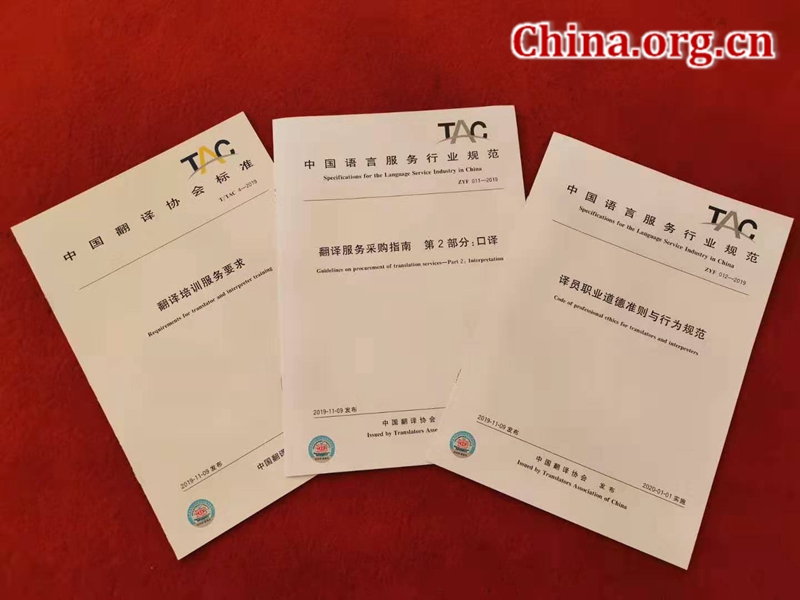China releases new translation standards, specifications
- By Zhang Rui
 0 Comment(s)
0 Comment(s) Print
Print E-mail China.org.cn, November 9, 2019
E-mail China.org.cn, November 9, 2019

The Translators Association of China (TAC) has released three sets of industrial standards and specifications at its annual conference in Beijing on Nov. 9.
In order to further standardize the language services market and promote the overall standardization of the translation industry, the TAC has released three sets of guides compiled and drawn up after its extensive survey and study. These guides are "Requirements for translator and interpreter training", "Guidelines on procurement of translation services — Part 2: Interpretation" and "Code of professional ethics for translators and interpreters".
The three sets of standards and specifications were officially launched at the Annual Conference of the Translators Association of China 2019, which includes the Forum on the Seven Decades of Development of China's Translation Industry since the Founding of the People's Republic of China. The event was held on Nov. 9 - 10 in Beijing.
The standard, "Requirements for translator and interpreter training", aims to promote the development of the language service industry. It outlines translation training services for translators-in-training, which include the requirements for institutions, faculty, courses and training. It will help establish, improve and promote the standard system of scientific norms in China's language service industry.
"Guidelines on procurement of translation services — Part 2: Interpretation" is designed to develop rules for purchasers and translation service providers to ensure good communication, and create a symmetry of information between the supply and demand sides. This will create a fair translation service procurement environment to maximize the protection of the interests of both sides. The specifications will meet the needs of the rapid development of China's interpretation services and effectively promote the sound development of the industry.
"Code of professional ethics for translators and interpreters" outlines the professional ethics and behavioral norms that translators and interpreters should follow when they engage in translation work. These norms can be applied to translators, interpreters and sign language interpreters to ensure that their professional behavior is in line with professional ethics. This code also regulates the professional behavior of Chinese translators and overseas translators practicing in China. This helps guide translators and interpreters as they make professional and ethical decisions in the course of their translation work. It will also help improve the professional ethics of translators and interpreters, ensure that they clearly know their responsibilities, maintain their professional reputation when providing translation services, and create an overall environment in which the translation industry functions harmoniously.
The TAC will continue to entrust the China Quality Mark Certification Group (CQM) to certify entities in the translation service industry. At the annual conference, the CQM also awarded certifications to four enterprises that passed the certification examinations.
Since the Chinese translation association first launched the translation service certification in 2018, it has completed the certification of seven enterprises. The CQM, registered by the Organization of National Register, is engaged in the certification and training service. The TAC said the CQM certification will continue pushing for international mutual recognition, and thus enhance China's participation and voice in developing and recognizing international rules for the certification of language services.
The association will also sign an agreement with the China National Institute of Standardization to set up a language service standardization working committee, which will be conducive to the regulation of, as well as the healthy and orderly development of the language service industry.
Founded in 1982, the TAC is the only national association for the translation and interpreting community and has individual members as well as association, institutional and corporate members. The TAC aims to protect the rights and interests of translators and interpreters, as well as the people engaged in the language service industry. It aims to uphold the quality of translation and interpreting, and facilitate understanding and cooperation among all the stakeholders of the language industry.
Guided by the China International Publishing Group (CIPG) and sponsored by the TAC, the Annual Conference of the Translators Association of China 2019 (TAC Conference 2019) was held in Beijing. The conference reviewed the development of translation and language services over the past seven decades since the founding of the People's Republic of China in 1949. The event was also an occasion to build on what had already been achieved, to foster more innovations in the field of translation and language services, promote the TAC's capabilities to better serve the country, the language services industry and members of the TAC, and establish a platform for international language service exchanges and cooperation.






Go to Forum >>0 Comment(s)